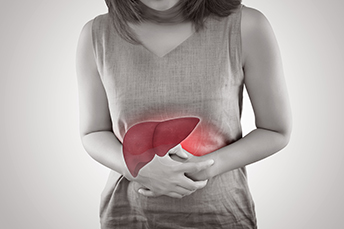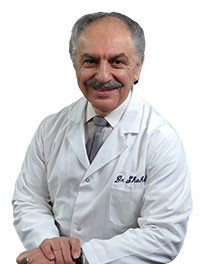Cirrhosis Treatment in Midland Park, NJ

The liver is our largest and most regenerative organ. It helps filter toxins from our blood, while absorbing, breaking down, and delivering vitamins and minerals to our organs via the bloodstream.
Cirrhosis is a chronic liver disease that occurs when healthy liver cells are replaced with scar tissue (fibrosis). This level of damage typically occurs over several years and is often stimulated by other liver conditions. Treatments must address these fibrosis-inducing conditions while preventing and managing cirrhosis complications.
Excessive alcohol consumption is a major cause of cirrhosis. About half the men who drink more than 8 ounces of alcohol a day for 20 years develop it. Usually, the more and the longer people drink, the greater their risk of alcoholic cirrhosis.
Early diagnosis and treatment are imperative to help prevent permanent liver damage. To schedule a consultation with a healthcare practitioner in Midland Park who specializes in cirrhosis treatment, call (201) 806-6099 or contact Dr. M.T. Shahab online.
Symptoms of cirrhosis
Cirrhosis symptoms vary depending on cause and severity. Early liver cirrhosis stages may present no symptoms. Over time, if there are no interventions, these symptoms may develop:
- fatigue
- appetite loss
- weight loss
- insulin resistance
- low blood sugar
- muscle cramps
- weakened immune function
- rough skin
- scurvy
- muscle wasting
- muscle cramps
- nausea
- confusion and disorientation
- mood changes
- swelling in the legs and ankles
- easily bruised skin
Malnutrition is a common symptom of cirrhosis. Alcohol can inhibit the absorption of vitamin B1 and magnesium. Vitamin A deficiency is also a factor in approximately 50% of alcoholic cirrhosis patients.
To prevent cirrhosis:
- avoid alcohol, insecticides, synthetic beauty products, cigarettes, and other toxins
- protect yourself from hepatitis by using protection during sex, not sharing needles, and not receiving tattoos and body piercings with unsanitary equipment
- receive the hepatitis B vaccine
- avoid unhealthy fats and cholesterol, as well as refined and processed sugar
- limit iron and copper in your diet as they can lead to cirrhosis
Causes of cirrhosis
Cirrhosis is the late stage of chronic biochemical imbalance, inflammation, and/or toxicity of the liver. Alcohol abuse is the most common cause. Studies have shown that growth hormone resistance and low levels of insulin-like growth factor (IGF)-I can also stimulate cirrhosis liver damage The long-term use of certain drugs – including antibiotics, anticonvulsants, antidepressants – have also been shown to contribute liver damage.
When a liver suffers repeated cell injury, its hepatic stellate cells respond by producing collagen (a fibrous, sticky substance) which scars and hardens surrounding tissue. This excessive connective tissue accumulates in the liver as hepatic fibrosis, which progresses, spreads, and stimulates cirrhosis symptoms.
Some of the major contributors to cirrhosis include:
- alcoholism: long term excessive drinking causes fatty deposits and liver inflammation
- viral hepatitis: hepatitis B and hepatitis C is contracted through sexual intercourse or exposure to infected blood
- nonalcoholic fatty liver disease: fat accumulates in the liver due to obesity, diabetes, hypertension, and elevated cholesterol and triglyceride levels
- long term use of pharmaceutical drugs: like methotrexate, acetaminophen, phenytoin, carbamazepine, antibiotics, statins, vitamin A and niacin overdose
- biliary obstruction: blockage of the bile duct causes the bile to back up into the liver instead of flowing to the small intestine, causing inflammation
- hemochromatosis: a condition that causes the body to absorb too much iron from food
- Wilson’s disease: a rare inherited disorder that causes copper to accumulate in the liver and other organs
Cirrhosis diagnosis
Early detection of cirrhosis can prevent permanent damage. Your healthcare provider may use the following tests:
- blood tests : to check for elevated bilirubin levels or elevated liver enzymes
- magnetic resonance elastography: to help detect hardening of the liver
- imaging tests: MRIs, ultrasounds, and CT scans can reveal liver abnormalities
- biopsy of the liver: to determine the extent of the liver damage
- traditional Chinese medicine (TCM) tongue analysis: swelling, red spots on the sides of the tongue, and half yellow/half white coating can indicate liver dysfunction
- TCM pulse diagnosis: a weak pulse on the cun and chi positions of the wrist can indicate liver dysfunction
- TCM facial diagnosis: detects abnormalities in eyes, mouth, and left cheek
- radioimmunoassay: measures concentrations of antigens (like hormone blood levels); detects cause of growth hormone deficiency
- urine urea nitrogen test: testing urine samples every 24 hours to detect growth hormone deficiency
Regular screening for liver cancer can also detect cirrhosis.
Cirrhosis treatments
Liver cirrhosis treatment commonly targets these underlying conditions: chronic alcohol abuse, chronic viral hepatitis B and C, nonalcoholic fatty liver disease, long term use of pharmaceuticals like methotrexate, hemochromatosis, Wilson’s disease, and biliary obstruction.
The following evidence-based pharmaceutical, regenerative, nutritional, and herbal treatments may present contraindications with one another, and/or with other medical conditions. As with any medical procedure, results of treating our most regenerative organ will vary from patient to patient depending on age, genetics, general health, condition severity, follow-up care, and environmental factors.
Always consult your health care professional before deciding which of these to try first:
- botanical medicine: botanicals from all over the globe have been shown to filter toxins and rebalance biochemicals in the liver
- acupuncture therapy: acupuncture needling may stimulate biochemical balance and repair liver function
- nutritional and supplemental treatments: liver-friendly food and supplements may alter the biochemical balance to revive function
- hormone therapy: growth hormone resistance—a core cirrhosis symptom—may be regulated with hormone injections
- stem cell therapy: as our most regenerative organ, the liver may be a good candidate for stem cell regeneration
- pharmaceutical treatments for cirrhosis: fast relief of symptoms can be achieved with these traditional standard drugs
- liver transplant: the last resort for severe cirrhosis
If left unaddressed, cirrhosis can lead to these health complications:
- jaundice
- anemia
- impaired blood clotting
- easy bruising
- erectile dysfunction
- edema
- gallstones
Request your appointment now
Early detection and management of underlying conditions can slow the progression of cirrhosis and prevent further liver damage. For information regarding the different types of cirrhosis and your liver cirrhosis treatment options, call (201) 806-6099 or contact Dr. M.T. Shahab online.
Medwell Orthopedics & Functional Medicine for Men & Women
Address
33 Central AveMidland Park, NJ 07432
(201) 806-6099
www.BergenCountyDoctors.com
Hours
Mon:
8:00 am - 8:00 pm
Tue:
2:00 pm - 7:00 pm
Wed:
8:00 am - 6:30 pm
Thu:
8:00 am - 1:00 pm
Fri:
8:00 am - 6:30 pm
Sat:
9:00 am - 1:00 pm
Sun:
By Appointment Only


